Have you ever heard of gamjatang?
Gamjatang is soup made with pork neck bones and vegetables. Sizzling hot gamjatang is hearty and savory which makes it always popular at the dinner table. The soft fatty meat picked from the gaps between the bones is especially tasty. The fully cooked cabbage and bean sprouts in the stock turn soft yet retain a crispy texture. Gamjatang makes a perfect, satisfying meal when paired with a bowl of rice.
And another selling point is that the main ingredient, pork neck bones (or spine bones) is very cheap. Combined with lots of vegetables, this soup is full of nutrients.
It’s unclear how this dish got it’s name. Some of you may know that gamja in Korean is potatoes. This soup always includes a cooked potato, so is that why it’s called gamjatang? But some people say gamja refers to the delicious meat around the pork spine bones, and that’s where it got its name. It’s still controversial and no one knows the true answer.
Some of you will remember that actually I posted the recipe long time ago, in 2009! Last month I had an event with my friend Hooni Kim at his New York restaurant. He’s also the head chef there and we made dinner and collaborated on some dishes. I entertained the readers who came to the restaurant to meet me, it was wonderful to see them.
One of my readers told me she makes gamjatang from my recipe very often and she always gets compliments from her family whenever she makes it. I realized I had forgotten about my gamjatang recipe because it was posted so long ago! I said: “The video must be blurry and low quality. Can you still learn the recipe from the video?” She said: “Yes, the recipe is still good!”
When I got home that night, I went back to watch my old gamjatang video. Oh my! I could make it better now with my HD camera and more accurate measurements. It decided to remake the video with a few changes to the original recipe.
Do you want to know what’s different? I skipped buchu (asian chives) and cooking wine this time because without them, I found it still tastes so good! And I simplified some of the process when I blanch the bones. I also soak the bones only 30 minutes instead of 2 hours. What else? Yes, I added 11 cups of water instead of 10 cups of water (my old version). So I can say that my revisiting this recipe means you can make a more delicious dish in less time now. : )
Good luck with making gamjatang. I’m looking forward to meeting you someday and hearing the story about the wonderful gamjatang you made from this recipe! : )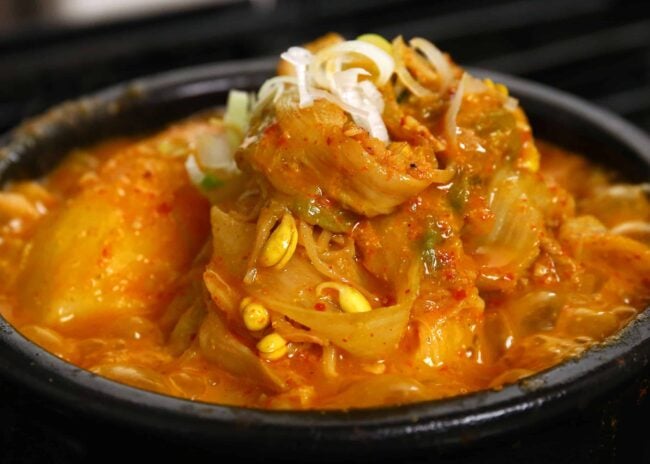
These are some tips for you if you make gamjatang tomorrow! : )
- Pork neck bones are found in the freezer section at a Korean grocery store. Try to choose bones with a lot of meat.
- My recipe is for 2 to 3 servings. If you want to make it for 4-6 servings, double the recipe and cook longer.
- Blanching and washing the bones is a very important step because it will remove the unpleasant smell from the bones and make a clear soup.
- You can replace perilla leaves with basil leaves and perilla seeds powder with sesame seeds powder.
The best perilla seeds powder to use is hulled and finely ground with a creamy color. You can also use toasted and ground, which is coarse and dark and kind of hard to swallow. Best to mix with water and strain and squeeze it, and use the water that is squeezed out in your gamjatang and discard the dregs. You can also grind whole toasted perilla seeds and then mix them with water, strain and squeeze out the milky liquid and use it. And if you can’t find any of these you can replace perilla seeds powder with sesame seeds powder.
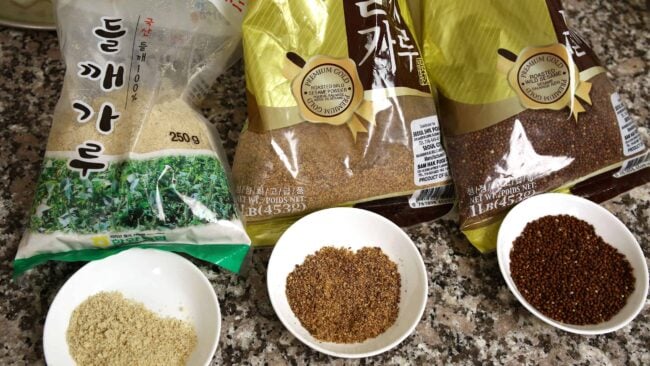 From left, skinned and ground powder, coarsely ground perilla seeds, and whole toasted perilla seeds
From left, skinned and ground powder, coarsely ground perilla seeds, and whole toasted perilla seeds
Ingredients
Makes 2-3 servings.
- 2½ to 3 pounds of pork neck bones (or spine bones)
- 1 ounce ginger, sliced
- 2 tablespoons doenjang (Korean fermented bean paste)
- 2 dried Shiitake mushrooms
- 1 medium onion, sliced
- 1 large dried red chili pepper (or a few red chili peppers)
- 1 pound of napa cabbage, cut off the core
- 2 or 3 medium potatoes, peeled
- 8 ounces soybean sprouts, washed and strained
- 4 green onions, washed and cut into 2 inch long
- 1 green onion, chopped for garnish
- 8 to 12 perilla leaves, washed
For seasoning paste:
- 6 garlic cloves, minced
- 3 tablespoons gochugaru (Korean hot pepper flakes)
- 1 tablespoon gochujang (Korean hot pepper paste)
- 3 tablespoons fish sauce
- ¼ cup deulkkae-garu (perilla seeds powder)
- ½ teaspoon ground black pepper
- ½ cup water
Directions
Cooking time: 2 hours.
Prepare the bones and broth
- Rinse the pork bones a couple of times and soak in cold water for at least 30 minutes.

- Bring a large pot of water to a boil. Blanch the cabbage for 1 minute and then take it out with tongs.
- Keep the hot water boiling, we’ll use it later for blanching pork bones.
- Rinse the cabbage in cold water and strain. Tear the leaves in lengthwise once or twice to make it long bite sized pieces.

- Put the bones into the boiling water and cover. Let them cook for 7 minutes over medium high heat. The water will turn dark and some foam will come to the surface.

- Strain the bones and wash each one in cold running water to remove any extra fat, dark foamy stuff, and bone fragments. Put the cleaned bones into a large pot.

- Add ginger, soy bean paste, dried shiitake mushrooms, onion, dried red pepper, and 11 cups of water. Cover and cook for 90 minutes over medium high heat.

While it cooks, make the seasoning paste
- Combine garlic, hot pepper flakes, hot pepper paste, fish sauce, perilla seeds powder, ground black pepper, and ¼ cup water in a bowl.
- Mix well until creamy.

Finish
- 90 minutes later, open the pot. Take out the 2 shiitake mushrooms and put them on your cutting board. Add the cabbage, soy bean sprouts, 3 green onions, and the peeled potatoes.

- Slice the mushrooms thinly and put them back to the pot. Add the seasoning paste. Add ¼ cup water and cover.


- Cook for 30 to 40 minutes over medium high heat until the potatoes are fully cooked. Test them by poking one with a chopstick or a bamboo skewer. If the chopstick goes through easily, it’s fully cooked.

- Add the perilla leaves and stir. You can serve right away with rice and a few more side dishes.

Serve
There are a few ways to serve, depending on how you like it:
- Ladle the soup into individual bowls and sprinkle each with some chopped green onion. You can also reheat the soup in earthenware bowls and then serve them to the table bubbling hot.

- Put all the soup in a large shallow pot, and sprinkle some chopped green onion over top. Put the pot in the center of the table along with the rice and some other side dishes. You can share it all together. I recommend giving out small individual bowls and a ladle so that people can put some soup in their bowl and enjoy it that way, instead of eating from the pot in the middle of the table.
Maangchi's Amazon picks for this recipe
It's always best to buy Korean items at your local Korean grocery store, but I know that's not always possible so I chose these products on Amazon that are good quality. See more about how these items were chosen.




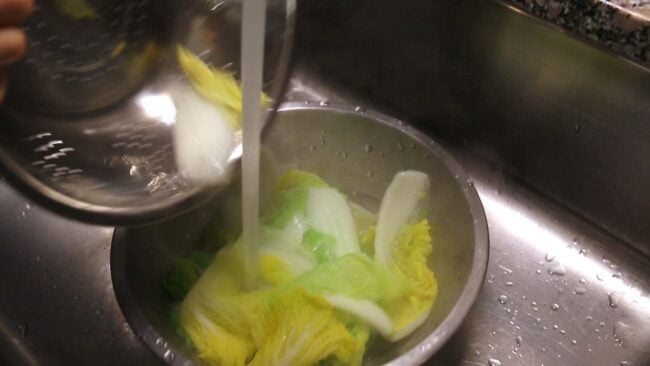
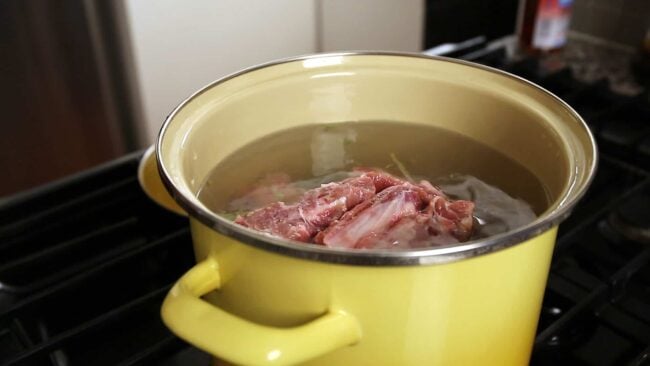
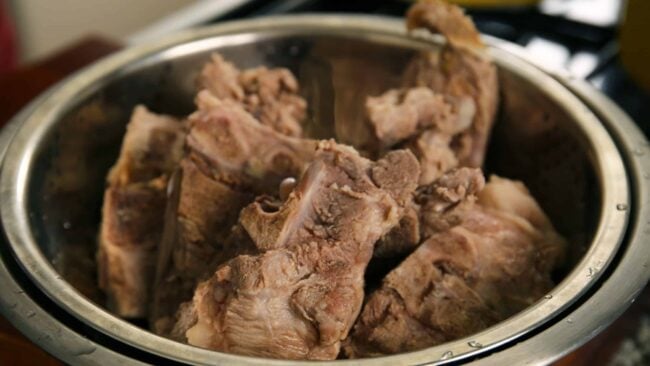
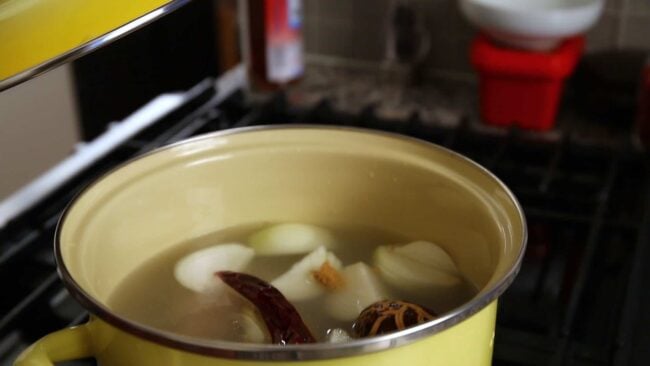
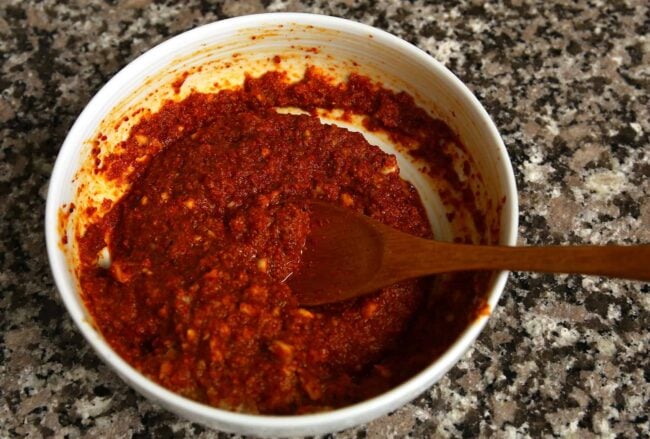
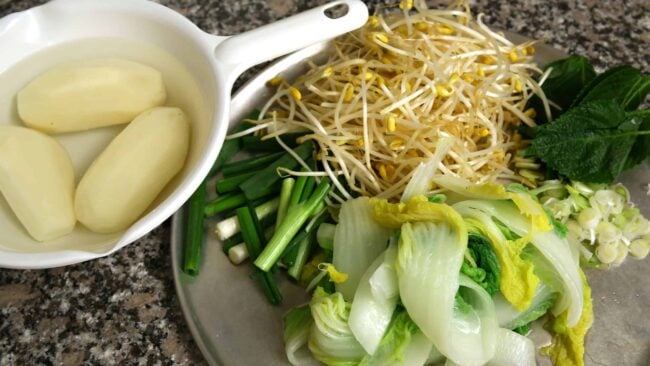
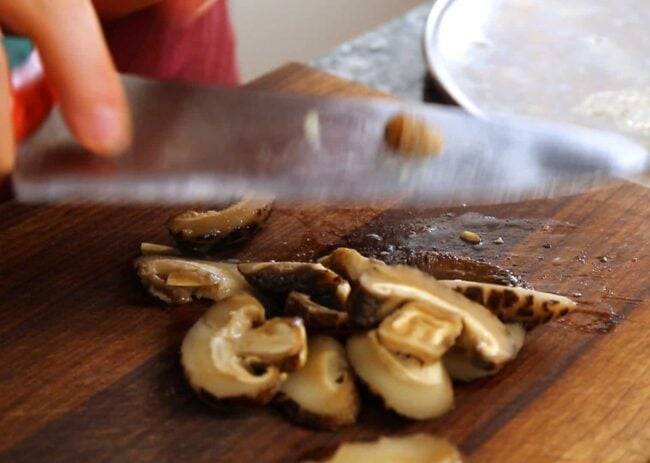
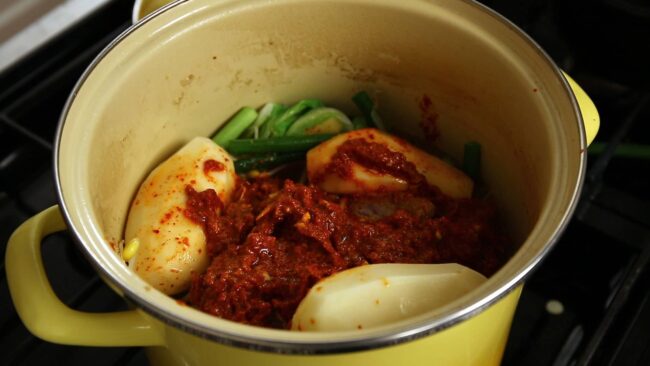
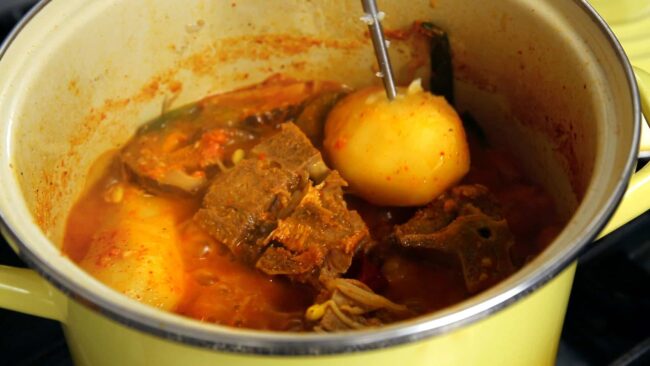
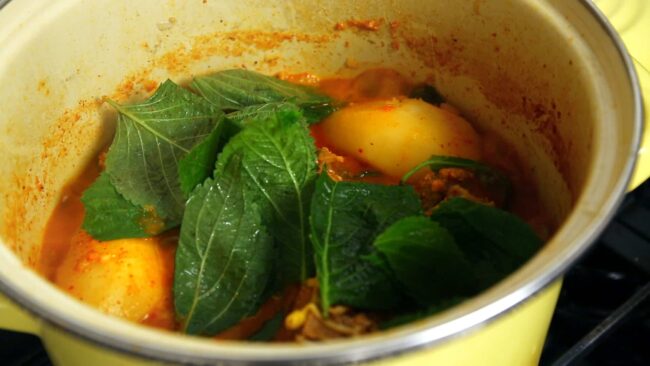


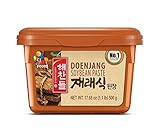





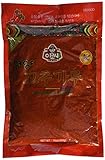
























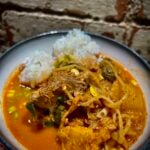
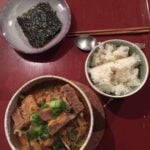
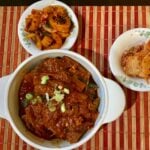
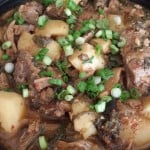
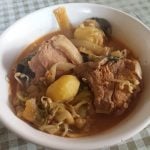
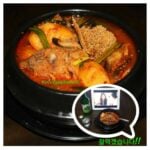
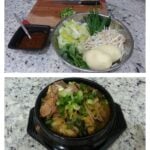
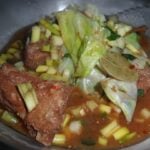

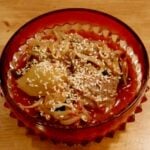
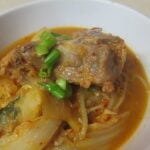


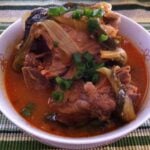
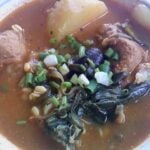
hi maangchi ssi. sorry out of the main menu topic. really loves to know how to cook hemul jim. can you share the recipe?
I wasn’t able to find the perilla powder at the korean grocery store instead I bought a bottle of “roasted perilla seeds”. The ingredient of which is “perilla sesame”. Can i use this for the gamjatang recipe ??? Already cooked 4 of your recipes each one came out just perfect for our tummy! Thanks!!!
yes, grind the roasted sesame seeds finely before using. Good luck with making delicious gamjatang!
Maangchi you make me hungry ….I love kamjatang. I remember my time in korea, I was eating it all the time.what can i use instead of sesame seeds?? we dont have it here
Skip it then. It will still turn out delicious.
What an amazing dish. My husband and I really enjoyed it. It took a long time to make, but it was worth every minute! Thanks so much for the amazing recipe Maangchi! :-)
Thank you very much! Happy cooking!
I am making tonight my first gamjatang following your method. It is SO delicious!
oh yeah, awesome! Happy cooking!
Hello, I just wanted to ask you what brand of pot cook ware do u use for your soups?
Hello maangchi..thank you for this site..I missed eating Gamjatang for a year now! This video will really help me to cook Gamjatang for my husband.It`s good that there are many Korean store here in Baguio City where I can buy the ingredients..More power to you!
Awesome! Good luck with making delicious gamjatang!
Love the music, Maangchi! I have not heard Scandal in a long time!
Can i use other sauce instead of hot paste/hot pepper? Because my hubby can not eat too spice but he does loved korean pork bone soup. And i wanna try to make this yummy soup for him. :)
yes, skip them. I would use soy sauce and soy bean paste.
i can’t find the Perilla seeds powder / leaves !! =( what can i replace it with?
Use normal sesame seed powder then. https://www.maangchi.com/ingredients/sesame-seeds
Thanks for your quick reply !! I will go search for the sesame seed powder tonight, and will make gamjatang over the weekend.
I hope it will be successful and delicious. I’ll post up pictures later =)
Thanks for ur recipe !!
u gotta use wild sesame powder otherwise it doesnt taste the same
Thanks so much for posting this recipe. I can’t wait to try it!
Thank you so much for this wonderful recipe and for all your wonderful recipes actually! I made this and it was soooo good especially in the cold winter! I wish I had the perilla though.. One day, I will make sure I find them and make this soup again. maybe it’ll go from good to amazing ;)
Look at my gamjatang!
http://mummyicancook.blogspot.com/2011/01/gamjatang-korean-pork-bone-soup.html
hi maangchi! im so thankful i found your recipes especially gamjatang!
i made this last jan.26,11 coz my parents in law visited our home for dinner. and woa! its really delicious! i also cooked jjapchae! my inlaws said im a good cook! i really love Korean Food! jeongmal! ^^,
p.s. Im really happy coz itwas my 1st time to cookfood for them & it turned out great! especially when i heard their “burps”like “buuuuurp” really made me smile ^______^.
thank you! ^^,
What kind of cooking wine do I use? Is there a specific brand?
Thank you so much for this recipe! My hubby and I live in northern NJ and there was a Korean restaurant in Fort Lee that served our favorite jeongols. Unfortunately, it closed down and I was so depressed! Today, I made your gamja tang recipe and it was delicious! It hit home perfectly and I am so happy that I can now make this at home. I tripled the ingredients for the perilla leaves (it’s my favorite) and I can’t wait to have it again. BTW, my hubby ate two huge bowlfuls! Thank you so much Maangchi!
Even though I made this as a non-spicy version and did not have the Perinella leaves or seeds, it still came out fabulous! I made it for my 18 month old son and he said, “HAIYAO” which means “I want more” in Chinese. I can’t wait to make the spicy version and use the Perinella leaves. Thanks Maangchi! Now i want to try all your other recipes!
oh so cute! : ) “Haiyao” I should remember the word!
Hi Maangchi,
I want to make about 10 to 15 portions of this so everyone can eat this, and I will probably have many serving myself.
I think I should just double and triple everything in the recipe, but with the chili paste, flakes, and pepper. I don’t know if that’s right.
What should I do? My family love spicy food, so I don’t spice will be the problem. I just wanted to make sure
I really don’t know the answer. You will have to do some experiments. But if I were you, I would multiply the ingredients by 7 or 8 for 15 servings.
Hi Maangchi,
Can this be made with anchovy and kelp stock instead. If so, what would be the measurements, do you think? Thanks!:)
I have made friends with a Korean couple who own a local business.
I gave them a container of my gamjatang. I was very nervous if they would like it.
I cook by memory taste and I have never had this before. I followed the recipe exactly (except I doubled the whole thing and made a giant pot, I also used a lot of perilla).
My children and husband loved it.
Most important my Korean friend said that it was excellent and that my gamjatang was better than hers. Wow, what a compliment. It’s really because I had an excellent recipe. That and I have fresh perilla from my garden.
Thank You again Maangchi for an authentic Korean recipe.
Sylvia
You made Korean friends? Awesome! I’m so happy to hear that your family and your Korean friends enjoy the gamjatang you made! oh, smells good!!
I made this today with perilla from my garden and asian chives from my garden. I usually cook by taste and experience, but I have never had this before. I doubled the recipe because we have a large family.
It is delicious. It has a good Korean flavor so I think I did everything right.
The only thing I didn’t have was the perilla seed poweder.
I saw them on FB! http://www.facebook.com/photo.php?pid=1258223&id=1547196983
wonderful!
Great site! Just discovered it.
I forgot to pick up the perilla seeds at the Korean grocery store and have been searching for them elsewhere to avoid the 20 minute drive (with no traffic – highly unlikely in London) back there.
Visited a local Chinese supermarket (big) but when questioned for the location of these ‘perilla seeds/powder’ using a variety of chinese, korean and japanese accents, all I got were blank stares and looks as if to say “what is this English idiot talking about”. I also muttered the Japanese term Shiso/Shizu to which they responded “Ahhh, Sushi!” :(
So, I will try to make this without perilla powder (I have the leaves). Ms Maangchi, will I succeed in making something edible without perilla powder or will it be a failure?
yes, it will still be delicious without deulkkaegaru.
https://www.maangchi.com/ingredients/deulkkae-garu
“all I got were blank stares and looks as if to say “what is this English idiot talking about”. I also muttered the Japanese term Shiso/Shizu to which they responded “Ahhh, Sushi!” :(” haha, so funny!
Should I use something in its place? Maybe sesame seeds?
yes, sesame seeds powder could be replaced with it, too.
I am not sure if I can find all the vegetable ingredients. Are all of them essential? I know you said the potato is a must. Which ones are optional or not optional? I don’t want to miss ingredients that may affect the taste of the soup too much!
This was the first dish i made from Maangchi’s site. It was “so delicious!” I find Korean cooking to be laborous. It takes multiple steps and lots of time (like French cooking). But your step by step instruction makes Korean cooking simple, enjoyable and delicious! Thank you, Maangchi for your dedication and for sharing. BTW, gamjatang was so good…I forgot to take a foto. :)
not cooking oil,, i mean is cooking wine..hehehehhehe soryyy..
can i use soju?
yes, you can use soju, why not? Good luck with making delicious gamjatang!
hello!…i want to cook a camjatang but i failed to find a “fish souce”
in the emart or grocery store. i cant find it. and also the cooking oil. one of my favorate food here in korea is the gamjatang…hu hu hu hu. i love to cook it plssss help me where can i find that fish sauce.and cooking oil. thankkk you..
Thank you for this recipe. I would like you to see my version since I used beef ribs rather than pork for this:
http://www.writingwithmymouthfull.com/2010/04/16/gamjatang-korean-rib-soup-recipe/
Your gamjatang looks great! “I think combining the two soups in this one recipe was a pretty good compromise even though Maangchi may slap my hand if she ever reads this..” no, no, no! lol
Anyeong Haseyo Maangchi – I just finished cooking gamjatang, it is indeed a success, kamsahamnida for a very good recipe =)
I’m glad your gamjatang turned out good, thank you for your update!
Hello maangchi !! I have made the soup and it tasted so good … I made it for a party so I made it at night but tomorrow I got fermented and it get too much sour!! I don’t know why? I finished cooked at 12am and I wake up at 12pm and it already got fermented :-( so I had to trow it in the garbage!!! Can you tell me why it happenning? Thanks ohhh and I love your website so muchhh keep going!!!!
Throwing it away is a very good decision. It’s not fermented but it’s spoiled! Don’t forget to keep it in the refrigerator once the soup cools down.
I’m making this tonight. May I know why you precook the cabbage? Can you put it in raw with the rest of the vegetables at the last 30 mins of cooking?
Thank you.
I am not 100% sure, but I assume that if you put raw cabbage in it. It will has a bit watery and fresh cabbage taste. I know normally korean use dry cabbage in this soup. Since it’s hard to find then what she suggest is the best.
can I use beef kneecaps for this recipe? My roommate bought the kneecaps and I have no idea what to do with them! (any suggestions?)
by the way this recipe looks delicious :)
Why don’t you make bone soup with beef bones?
Just boil them with lots of water hours and hours until you get milky bone soup.
Hello! Thanks for this delicious recipe! I made this for dinner and my husbands wants it everyday! I am very happy with all your recipes! Thank you!!!
haha, everyday? no, he will get tired of it soon. next time how about making soybean sprout soup which is very basic, popular, and delicious!
https://www.maangchi.com/recipe/kongnamulguk
Hehe.. I’ve made most of your recipes now and my husband is anxiously awaiting for me to make all your recipes. I made Kongnamulguk just the way you had it, and you are right! I think I’ve created a monster! ^_^ All your portions are perfect for 2-4 servings so we always make enough for dinner and lunch box for the next day.
ooh, reading your comment makes me feel like kongnamulguk right now! I should make it soon for myself. I have well fermented radish kimchi, so it will be perfect to enjoy the soup.
Hello
I always wanted to learn how to cook korean food! Your site is wonderful.
The soybean paste, can I replace it with the chinese version?
Can I use something else besides the pork bone neck or even replace it?
Thank you!
You could use pork spine bones, too.
so basically is has to be pork with bone right?
thank you for reply^^
I finally found the soybeanpaste but I am not sure is the correct one. Is made in Korea and has the name Mong-Go. Can I use this? thank you
I used Chinese Soybean Paste. It says “sweetened soybean paste”. I think it’s not as strong as the one Maangchi used. I put in almos 4 tbsp of it before I got any taste at all. But in the end, it all taste so yummy.
Hey just wanted to share a few things with all of you
I LOVE THIS SOUP
and uhh thats it i think
Thank you very much!
I tried your recipe. It was pretty good, but it wasn’t much like the gamjatang you find in restaurants. There seems to be a really strong fermented soybean taste in this recipe, but how come there’s practically none in the restaurant versions?
Our family doesn’t really like the fermented soybean smell/taste. That stuff is strong!
skip soy bean paste if you want. This is a very authentic recipe. You can modify the recipe to your taste. If you like to learn Korean cooking, you will have to try getting accustomed to fermented food such as soy bean paste, hot pepper paste, fermented fish sauce which are very important in Korean cuisine.
Hi, thanks for this receipt, really enjoyed it.
I used pork ribs instead, still delicious, hot, spicy, yummy,yummy!!
Pork ribs sounds terrific! : ) Wonderful!
hi! i’m from the u.s. and i have been living in south korea (and teaching english) for about 2.5 years! i just came across your cooking videos today and i love them! i’ve always wanted to know how to make rice cakes and your videos are really helpful. also i love gamchatang and i’m excited that i know how to make it now! :o) it’s good to know you can get most of these ingredients in the states so i can make my favorites after we move back there :o)
Welcome to my website! That’s right, when you come back to your home, you can make all kinds of Korean dishes!